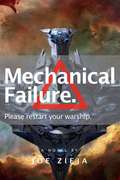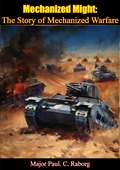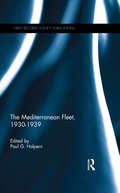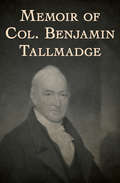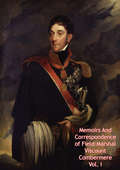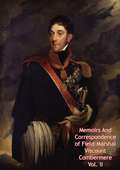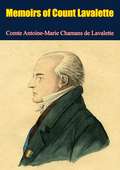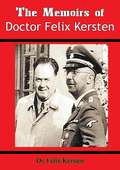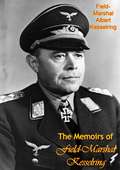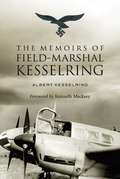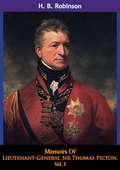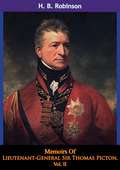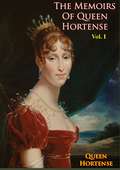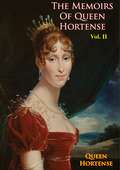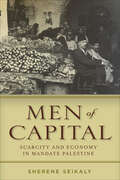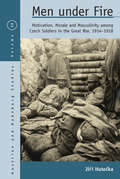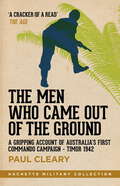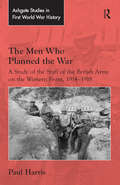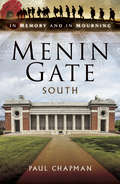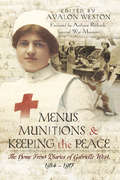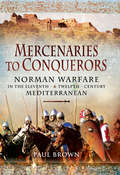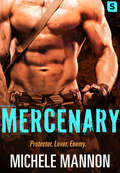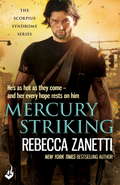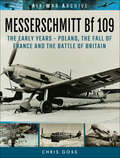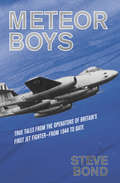- Table View
- List View
Mechanical Failure (Epic Failure Trilogy #1)
by Joe ZiejaA smooth-talking ex-sergeant, accustomed to an easygoing peacetime military, unexpectedly rejoins the fleet and finds soldiers preparing for the strangest thing—war.The two hundred years’ (and counting) peace is a time of tranquility that hasn’t been seen since...well, never. Mankind in the Galactic Age had finally conquered war, so what was left for the military to do but drink and barbecue? That’s the kind of military that Sergeant R. Wilson Rogers lived in before he left the fleet to become a smuggler. But it turns out that smuggling is hard. Like getting-arrested-for-dealing-with-pirates-and-forced-back-into-service kind of hard. It doesn’t seem so bad—the military was a perpetual tiki party anyway—but when Rogers returns after only a year away, something has changed. These are soldiers—actual soldiers doing actual soldier things like preparing for a war that Rogers is sure doesn’t exist. Rogers vows to put a stop to all this nonsense—even if it means doing actual work. With an experienced ear for military double-speak, Zieja has created a remarkable and sarcastic adventure.
Mechanized Might: The Story of Mechanized Warfare
by Lt.-Gen. Robert Lee Bullard Major Paul. C. RaborgOriginally published in 1942, this book gave the first popular account of mechanized warfare—a subject on which its author, Major Paul C. Raborg, was a thorough master.Raborg describes the unchanging character of military strategy and the mechanized armies of today, gives a detailed and complete picture of America’s new armies now in the field, and illustrates high-power blitzkrieg tactics with an analysis of the Battle of France where operations of the Nazis proceeded “according to plan.”“The entire future of our world depends on the mechanized might which is produced by the United States. Although no victory in this new war of speed can be accomplished without superiority in the air, and although naval strength figures prominently in this most terrible of all conflicts, the Second World War, no victories can be decisive, complete, or final without the most efficient mechanized and motorized land armies.[…]“The descriptions set forth herein are vitally necessary so that every citizen of the United States and of all the democracies may fully realize the mechanized might of our present new armies and the overpowering mechanized might that is planned for the future and thereby know that, regardless of reverses, eventual victory is certain.”“Mechanized Might is written in a style easy for the general public to understand. The book has tremendously intrigued and interested me, for I, like its author, took active part in the First World War and have since watched with unflagging interest all developments, especially in regard to the smashing style of German warfare that has wrecked Europe. I cannot see how this book can fail to interest everybody, especially as we are in a war of frightfulness up to now unequaled in history.[...]”—Lt.-Gen. Robert Lee Bullard, Introduction, Mechanized Might
The Mediterranean Fleet, 1930-1939 (Navy Records Society Publications)
by Paul HalpernThe Mediterranean Fleet entered the 1930s looking back to the lessons of Jutland and the First World War but also seeking to incorporate new technologies, notably air power. Unfortunately in the depression years of the early 1930s there was a lack of funds to remedy deficiencies. The problem became critical during the Abyssinian crisis of 1935. The crisis wound down by mid-1936 but the respite did not last long. In June 1936 the Spanish Civil War broke out and the Mediterranean Fleet was soon involved in evacuations of British and other endangered foreigners from Spanish ports as well as the protection of British flagged merchant ships in the war zone. <p><P> In addition to the Spanish Civil War there was an increase of tension with Germany in 1938 that culminated with the Czechoslovak crisis in September. The situation of the Mediterranean Fleet and its possible actions had the Munich agreement not been reached are described. The Spanish Civil War ended in 1939 with the victory of the Nationalists and the Mediterranean Fleet was again involved in evacuations. By now the prospect of war with Germany and possibly Italy was quite clear and serious preparations for war continued. The plans for war in the Mediterranean are reproduced in detail.
Memoir of Col. Benjamin Tallmadge: Prepared By Himself, At The Request Of His Children (classic Reprint)
by Benjamin TallmadgeGuerilla, rebel, politician, spy--Col. Benjamin Tallmadge lived one of the most remarkable lives of the American Revolution When British troops defeated the Continental Army on Long Island, Gen. George Washington was forced to abandon New York in order to save the revolution. The British established their headquarters in New York City, beginning an occupation that would last the length of the war. Priceless intelligence flowed through the city's harbor, and Washington wanted to claim it as his own. To Benjamin Tallmadge, a young officer of the Continental Army, the general assigned an impossible mission: Infiltrate New York, establish a spy network, and report everything the British know. Throughout the war, Tallmadge and his spies collected intelligence on troop movements, sneak attacks, and the treachery of Benedict Arnold. Nearly two and a half centuries later, the heroic exploits of the Culper Spy Ring serve as the inspiration for the acclaimed TV series Turn: Washington's Spies and the video game Assassin's Creed III. In this lively and engaging memoir, the days of revolution are remembered by a patriot who fought in the shadows--and helped redefine the nature of espionage.
Memoirs And Correspondence of Field-Marshal Viscount Combermere Vol. I (Memoirs And Correspondence of Field-Marshal Viscount Combermere #1)
by Field Marshal Stapleton CottonField Marshal Stapleton Cotton, 1st Viscount Combermere GCB GCH KSI PC (14 November 1773 - 21 February 1865), was a British Army officer, diplomat and politician. As a junior officer he took part in the Flanders Campaign, in the Fourth Anglo-Mysore War and in the suppression of Robert Emmet's insurrection in 1803. He commanded a cavalry brigade in Sir Arthur Wellesley's Army before being given overall command of the cavalry in the latter stages of the Peninsular War. He went on to be Commander-in-Chief, Ireland and then Commander-in-Chief, India. In the latter role he stormed Bharatpur--a fort which previously had been deemed impregnable.This book, which was published in two volumes, represents Viscount Combermere's memoirs in the form of a vast collection of his private papers, as collated by his third wife, Mary, Viscountess Combermere. They serve to provide an invaluable and comprehensive view of the public and private life of one of England's most distinguished soldiers.
Memoirs And Correspondence of Field-Marshal Viscount Combermere Vol. II (Memoirs And Correspondence of Field-Marshal Viscount Combermere #2)
by Field Marshal Stapleton CottonField Marshal Stapleton Cotton, 1st Viscount Combermere GCB GCH KSI PC (14 November 1773 - 21 February 1865), was a British Army officer, diplomat and politician. As a junior officer he took part in the Flanders Campaign, in the Fourth Anglo-Mysore War and in the suppression of Robert Emmet's insurrection in 1803. He commanded a cavalry brigade in Sir Arthur Wellesley's Army before being given overall command of the cavalry in the latter stages of the Peninsular War. He went on to be Commander-in-Chief, Ireland and then Commander-in-Chief, India. In the latter role he stormed Bharatpur--a fort which previously had been deemed impregnable.This book, which was published in two volumes, represents Viscount Combermere's memoirs in the form of a vast collection of his private papers, as collated by his third wife, Mary, Viscountess Combermere. They serve to provide an invaluable and comprehensive view of the public and private life of one of England's most distinguished soldiers.
Memoirs of Count Lavalette
by Alfred-Auguste Cuvillier Fleury Comte Antoine-Marie Chamans de LavaletteAntoine Marie Chamans, comte de Lavalette (14 October 1769 – 15 February 1830) lived during the turbulent era of the French Revolutionary and Napoleonic Wars. Whilst fighting in the 1796 Italian campaign he came to the attention of Napoleon Bonaparte, who took him into his personal staff. It was from this moment he became one of Napoleon’s most trusted adherents. He recounts in these fascinating memoirs his service to the Emperor in both military and civil capacities, including as head of clandestine postal surveillance. His escape from the guillotine of the Bourbons, following Napoleon’s fall, is worthy of a novel on its own. But perhaps most interesting at all is the accounts of the Emperor, with whom he had the most close association.
The Memoirs of Doctor Felix Kersten
by Dr Ernst Morwitz Konrad Maiden Dr Felix KerstenThis book, first published in English translation in 1947, is the fascinating autobiography of Dr. Felix Kersten, a Russian-born Finnish osteopath who tended to Heinrich Himmler in Germany during World War II and who contended he had obtained some amelioration of treatment of Jews and others.
The Memoirs of Field-Marshal Kesselring
by Lynton Alfred Hudson Field-Marshal Albert KesselringOne of the only published memoirs of a WWII General Field-Marshall, these are the comprehensive memoirs of one of Germany's most prominent German air and field commanders and military strategists.Kesselring describes in detail the military training, his service in World War I, his work in the Reichswehr, his role in the founding of the Luftwaffe, and all aspects of his command in World War II.Concluding with Kesselring's account of his trial and imprisonment for war crimes, these memoirs give a full picture of the whole military experience of one of Germany's great commanders.
Memoirs of Field-Marshal Kesselring
by Kenneth Macksey Albert KesselringOne the great military autobiographies of World War II. Field Marshal Albert Kesselring was one of Germany’s most capable military strategists. Originally a Bavarian army officer, he transferred to the Luftwaffe in 1935 and became Göring’s deputy, commanding air fleets during the invasion of France and the Battle of Britain. In 1941, he was appointed Commander-in-Chief South, sharing the direction of the North African campaign with Rommel. As Commander-in-Chief in Italy in 1943-44, his brilliant defense of the peninsula became legendary. In 1945, after the Ardennes offensive failed, Kesselring replaced von Rundstedt as Commander-in-Chief West. In his memoirs, Kesselring describes his military training, his service in World War I, his work in the Reichswehr, his role in the founding of the Luftwaffe, and all aspects of his command in World War II. Conducing with Kesselring’s account of his trial and imprisonment for war crimes, these memoirs give a full picture of the whole military experience of one of Germany’s great commanders. Skyhorse Publishing, as well as our Arcade imprint, are proud to publish a broad range of books for readers interested in history--books about World War II, the Third Reich, Hitler and his henchmen, the JFK assassination, conspiracies, the American Civil War, the American Revolution, gladiators, Vikings, ancient Rome, medieval times, the old West, and much more. While not every title we publish becomes a New York Times bestseller or a national bestseller, we are committed to books on subjects that are sometimes overlooked and to authors whose work might not otherwise find a home.
Memoirs Of Lieutenant-General Sir Thomas Picton, Vol. I (Memoirs Of Lieutenant-General Sir Thomas Picton)
by H. B. RobinsonWhen Lt.-General Thomas Picton fell during a furious bayonet charge he left behind a legacy of hard fighting, high courage, volatile temper and much military glory accrued at the head of his fighting 3rd Division. In this excellent and very detailed biography, based on the Generals own private letters, recounts his long service and glittering career in the Peninsular War and the Waterloo Campaign.Includes over 100 maps of the actions, engagements and battles of the entire Peninsular War.
Memoirs Of Lieutenant-General Sir Thomas Picton, Vol. II (Memoirs Of Lieutenant-General Sir Thomas Picton)
by H. B. RobinsonWhen Lt.-General Thomas Picton fell during a furious bayonet charge he left behind a legacy of hard fighting, high courage, volatile temper and much military glory accrued at the head of his fighting 3rd Division. In this excellent and very detailed biography, based on the Generals own private letters, recounts his long service and glittering career in the Peninsular War and the Waterloo Campaign.Includes over 100 maps of the actions, engagements and battles of the entire Peninsular War.
The Memoirs of Queen Hortense Vol. I (The Memoirs of Queen Hortense #1)
by Jean Hanoteau Arthur Kingsland Griggs Queen Hortense Eugénie Cécile BonaparteIn presenting to the public the Memoirs of Queen Hortense exactly as she recorded them, in exposing it to scholars--with an intrinsic and absolute respect for the integral historical accuracy of the text--these intimate revelations as set down by her royal hand, Prince Napoleon did a service not only to history but also to the memory of a princess too often harshly criticized eminently French in her heart and mind, to the memory of an unfortunate Queen, to the memory of an exquisite woman.Like the Emperor, one of whose shadows she was and whose touching and affectionate farewell smile she received as he was leaving France for the last time, the Queen of Holland has nothing to lose by having all her acts and even her mistakes fully revealed.This becomes very clear as one peruses these volumes where she took care not to avoid any of the difficulties of her task. She knew what society said about her; she was aware of the reproaches, justified and unjustified, of which she was the object. Frequently, reading between the lines one is conscious of the care her pen took to refute certain implications, sometimes with disdain but never without courage.
The Memoirs of Queen Hortense Vol. II (The Memoirs of Queen Hortense #2)
by Jean Hanoteau Arthur Kingsland Griggs Queen HortenseIn presenting to the public the Memoirs of Queen Hortense exactly as she recorded them, in exposing it to scholars--with an intrinsic and absolute respect for the integral historical accuracy of the text--these intimate revelations as set down by her royal hand, Prince Napoleon did a service not only to history but also to the memory of a princess too often harshly criticized eminently French in her heart and mind, to the memory of an unfortunate Queen, to the memory of an exquisite woman.Like the Emperor, one of whose shadows she was and whose touching and affectionate farewell smile she received as he was leaving France for the last time, the Queen of Holland has nothing to lose by having all her acts and even her mistakes fully revealed.This becomes very clear as one peruses these volumes where she took care not to avoid any of the difficulties of her task. She knew what society said about her; she was aware of the reproaches, justified and unjustified, of which she was the object. Frequently, reading between the lines one is conscious of the care her pen took to refute certain implications, sometimes with disdain but never without courage.
Men of Capital: Scarcity and Economy in Mandate Palestine
by Sherene SeikalyMen of Capital examines British-ruled Palestine in the 1930s and 1940s through a focus on economy. In a departure from the expected histories of Palestine, this book illuminates dynamic class constructions that aimed to shape a pan-Arab utopia in terms of free trade, profit accumulation, and private property. And in so doing, it positions Palestine and Palestinians in the larger world of Arab thought and social life, moving attention away from the limiting debates of Zionist-Palestinian conflict. Reading Palestinian business periodicals, records, and correspondence, Sherene Seikaly reveals how capital accumulation was central to the conception of the ideal "social man. " Here we meet a diverse set of characters--the man of capital, the frugal wife, the law-abiding Bedouin, the unemployed youth, and the abundant farmer--in new spaces like the black market, cafes and cinemas, and the idyllic Arab home. Seikaly also traces how British colonial institutions and policies regulated wartime austerity regimes, mapping the shortages of basic goods--such as the vegetable crisis of 1940--to the broader material disparities among Palestinians and European Jews. Ultimately, she shows that the economic is as central to social management as the political, and that an exclusive focus on national claims and conflicts hides the more complex changes of social life in Palestine.
Men Under Fire: Motivation, Morale, and Masculinity among Czech Soldiers in the Great War, 1914–1918 (Austrian and Habsburg Studies #26)
by Jiří HutečkaIn historical writing on World War I, Czech-speaking soldiers serving in the Austro-Hungarian military are typically studied as Czechs, rarely as soldiers, and never as men. As a result, the question of these soldiers’ imperial loyalties has dominated the historical literature to the exclusion of any debate on their identities and experiences. Men under Fire provides a groundbreaking analysis of this oft-overlooked cohort, drawing on a wealth of soldiers’ private writings to explore experiences of exhaustion, sex, loyalty, authority, and combat itself. It combines methods from history, gender studies, and military science to reveal the extent to which the Great War challenged these men’s senses of masculinity, and to which the resulting dynamics influenced their attitudes and loyalties.
The Men Who Came Out of the Ground: A Gripping Account of Australia's First Commando Campaign
by Paul Cleary'This account . . . is breathtaking in its scope and riveting in its research' - Sydney Morning HeraldThe gripping story of a small force of Australian Special Forces commandos that launched relentless hit and run raids on far superior Japanese forces in East Timor for most of 1942.These Australians were the men of the 2/2nd Australian Independent Company - a special commando unit. Initially stranded without radio contact to Australia, the Japanese declared these bearded warriors `outlaws? and warned they would be executed immediately if captured. The Australians drawn mainly from the bush, were chosen for their ability to operate independently and survive in hostile territory. As film-maker Damien Parer said after visiting in Timor in late 1942, `these men are writing an epic of guerrilla warfare?.Expertly researched by Paul Cleary, who is fluent in Tetum, the main language of the indigenous group of East Timor, it also contains insightful black and white photos.'A cracker of a read' - The Age'Paul Cleary has brought to life one of the great success stories of World War II' - Daily Telegraph
The Men Who Planned the War: A Study of the Staff of the British Army on the Western Front, 1914-1918 (Routledge Studies in First World War History)
by Paul HarrisDuring the Allied victory celebrations there were few who chose to raise a glass to the staff. The high cost of casualties endured by the British army tarnished the reputation of the military planners, which has yet to recover. This book examines the work and development of the staff of the British army during the First World War and its critical role in the military leadership team. Their effectiveness was germane to the outcome of events in the front line but not enough consideration has been paid to this level of command and control, which has largely been overshadowed by the debate over generalship. This has painted an incomplete picture of the command function. Characterised as arrogant, remote and out of touch with the realities of the front line, the staff have been held responsible for the mismanagement of the war effort and profligate loss of lives in futile offensives. This book takes a different view. By using their letters and diaries it reveals fresh insights into their experience of the war. It shows that the staff made frequent visits to the front line and were no strangers to combat or hostile fire. Their work is also compared with their counterparts in the French and German armies, highlighting differences in practice and approach. In so doing, this study throws new light upon the characteristics, careers and working lives of these officers, investigating the ways in which they both embraced and resisted change. This offers evidence both for those who wish to exonerate the British command system on the basis of the learning process but also for those critical of its performance, thus advancing understanding of British military history in the First World War.
Menin Gate South: In Memory and In Mourning (In Memory and in Mourning)
by Paul ChapmanThis is a comprehensive and highly emotive volume, borne of years of intensive research and many trips to the battlefields of the Great War. It seeks to humanise the Menin Gate Memorial (South), to offer the reader a chance to engage with the personal stories of the soldiers whose names have been chiseled there in stone. Poignant stories of camaraderie, tragic twists of fate and noble sacrifice have been collated in an attempt to bring home the reality of war and the true extent of its tragic cost. It is hoped that visitors to the battlefields, whether their relatives are listed within or not, will find their experience enriched by having access to this treasure trove of stories.
Menus, Munitions and Keeping the Peace: The Home Front Diaries of Gabrielle West 1914–1917
by Avalon WestonWhen Gabrielle West wrote diaries about her war to send to her much missed favorite brother in India she had no idea that a hundred years later they would be of interest to anyone.Soon after the outbreak of the First World War, Vicars daughter Gabrielle joined the Red Cross and worked as a volunteer cook in two army convalescent hospitals. She then secured paid positions in the canteens of the Farnborough Royal Aircraft Factory and then the Woolwich Arsenal, where she watched Zeppelin raids over London during her night shifts. Having failed a mental arithmetic test to drive a horse-drawn bread van for J. Lyons, she was among the first women enrolled in the police and spent the rest of the war looking after the girls in various munitions factories.Gabrielle wrote about and drew what she saw. She had no interest in opinion or politics. She took her bicycle and her dog Rip everywhere and they appear in many of her stories. She had a sharp eye and sometimes a sharp pen.At the end of the war she was simply sent home. She spent the rest of her life caring for relatives. She lived to 100 and never married. The First World War was her big adventure.These days, the reader might feel MI5 should worry about those detailed line drawings of the processes in the factories being sent by Royal Mail across the world but a hundred years ago?
Mercenaries to Conquerors: Norman Warfare in the Eleventh & Twelfth-Century Mediterranean
by Paul BrownWhen a band of Norman adventurers arrived in southern Italy to fight in the Lombard insurrections against the Byzantine empire in the early 1000s, few would have predicted that within a generation these men would have seized control of Apulia, Calabria and Sicily. How did they make such extraordinary gains and then consolidate their power? Paul Brown, in this thoroughly researched and absorbing study, seeks to answer these questions and throw light onto the Norman conquests across the Mediterranean. Throughout he focuses on the military side of their progress, as they advanced from mercenaries to conquerors, then crusaders. The story of the campaigns they undertook in Italy, Sicily, the Balkans and the Near East reveals their remarkable talent for war. The dominant role played by a succession of Norman leaders is a key theme of the narrative a line of ambitious and ruthless soldiers that ran from Robert Guiscard and Bohemond to Roger II and Tancred.
Mercenary
by Michele MannonSometimes in life, choices just aren't part of the plan. When fate interferes and bulldozes right over you.That's how I felt the first time I saw him. Standing in my kitchen, soaking wet, hotter than a man has the right to be, and holding a knife.Declan's cold, stone-cold. I can't help but want him. His presence stirs up some raw emotion within me. He seems so...alone. But is he here to kill me or save me?He's the one man I should never want...and the one I can never forget.
Mercury Striking: A thrilling page-turner of dangerous race for survivial against a deadly bacteria... (The Scorpius Syndrome)
by Rebecca Zanetti'This dark, post-apocalyptic tale is a testament to the power of hope and love against all odds' Romantic TimesIt's a dangerous race for survival in the aftermath of a deadly bacteria spreading across the globe.One man protects the weak and leads the strong and every hope rests on him...With nothing but rumors to lead her, Lynne Harmony has trekked across a nightmare landscape to find one man - a mysterious, damaged legend who protects the weak and leads the strong. He's more than muscle and firepower - and in post-plague L.A., he's her only hope. As the one woman who could cure the disease, Lynne is the single most volatile - and vulnerable - creature in this new and ruthless world. But face to face with Jax Mercury, danger has never looked quite so delicious...'Thrilling post-apocalyptic romance at its dark, sizzling best!' Lara AdrianFor more thrilling passion played out against the dangerous race for survival, look for all the titles in The Scorpius Syndrome series: Mercury StrikingShadow FallingJustice AscendingStorm GatheringWinter IgnitingKnight Awakening
Messerschmitt Bf 109: Poland, the Fall of France and the Battle of Britain (Air War Archive Ser.)
by Chris GossThe most iconic German aircraft of the Second World War, the Messerschmitt Bf 109 was the Luftwaffes principal fighter from 1939 until 1942 when the superior Focke-Wulf Fw 190 came into greater prominence. The Bf 109 served in every theater of the war, particularly in the invasion of France and the Low Countries, the Battle of Britain and the invasion of the Soviet Union, the Mediterranean and with Rommel in North Africa. In the later years of the war, the Bf 109 fought with success in the defense of Germany against the Allied bombers. The Bf 109 was the most produced fighter aircraft in history and more aerial kills were made with this fighter than any other aircraft. In this selection of unrivaled images collected over many years, and now part of Frontline's new War in the Air series, the operations of this famous aircraft in the early part of the Second World War are portrayed and brought to life.
Meteor Boys: True Tales from the Operators of Britain's First Jet Fighter–From 1944 To Date
by Steve BondThrough the first-hand experiences of pilots and ground crew, the author of Javelin Boys chronicles the history of the RAF’s first jet-engined aircraft. As Britain’s first jet fighter, the Gloster Meteor has had a remarkably varied and lengthy life. But while many books have focused on its development and service history, the time has come to hear the personal experiences of its air and ground crews. By interviewing over thirty veterans, author and Meteor veteran Steve Bond has written an incredibly detailed insight into this iconic aircraft, which is supported by anecdotes and accounts from those who knew it best. One example is Alan McDonald who described the Meteor as “a bit unforgiving if you got it wrong, as many pilots found out to their cost, especially on one engine, but I must admit I got to like it very much—it was a great adrenaline rush.” Alongside these entertaining anecdotes are details of the Meteor’s origins and developments. Starting with the first deliveries in 1944 working through to the present day, Bond documents the diverse role that the Meteor has had—from operations against the V1 and photo-reconnaissance missions to its use as a training machine and later as a display aircraft. The book also features photographs never seen before in print. This detailed history of this iconic and much loved jet fighter will appeal to all aviation fans. “Bond has done a great job with this book with many personal accounts of the people that were involved every day in the life of the Meteor. Highly Recommended.” —International Plastic Modelers’ Society/USA
